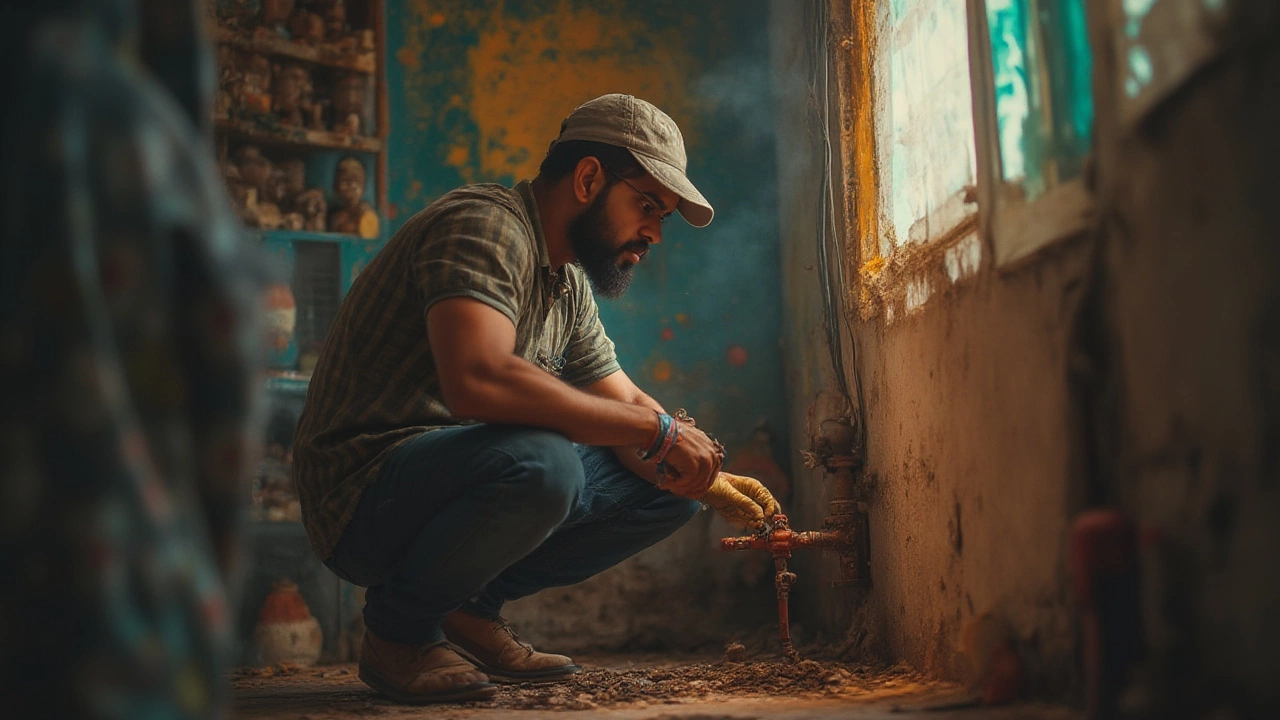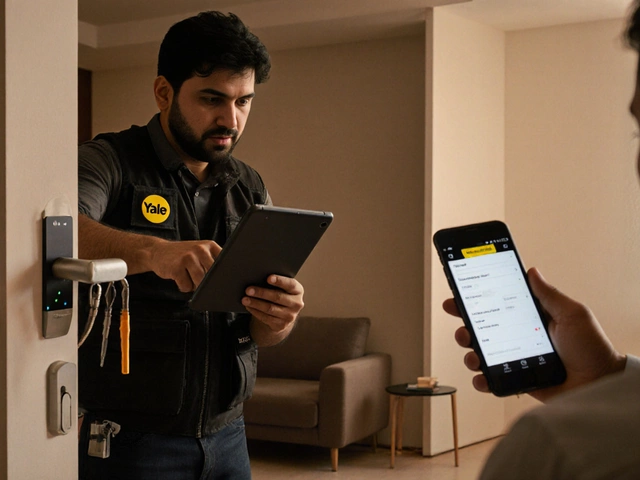You’d think plumbers live in a world of wrenches and water leaks, but their real struggle? Balancing work hours that often stretch way beyond a simple 9-to-5. Plumbing isn’t a desk job with fixed breaks and tidy schedules. Some weeks, plumbers find themselves working overnight, crawling under sinks at 2am, or rescuing families from burst pipes on Christmas morning. The surprises don’t end there. Sometimes the phone doesn’t ring for days, and other times, back-to-back emergencies swallow up their whole weekend. Ever wondered what their average day really looks like?
The Average Plumber’s Work Schedule
Most folks imagine plumbers with a toolbox and a set start and end time, but reality rarely looks like that. The average full-time plumber in the UK typically clocks around 37 to 45 hours a week, according to the Office for National Statistics. But don’t let that tidy number mislead you. A plumber’s day usually starts before sunrise, especially if they’re heading to a big construction site or have clients with school-going kids who need their water heater fixed before breakfast. Finishing times are a guessing game, too. Jobs don't always fit into neat time slots—some days wrap up by early afternoon, while others run long into the night.
There’s a huge difference between self-employed plumbers and those working for big companies. If you go solo, you control your calendar, but your working hours depend on client calls, emergencies, and sometimes your willingness to chase extra income. Larger firms may set shifts—some stick to regular business hours, while others demand rotating overnight emergency cover. One survey by UK plumbing supplier Wolseley found about 35% of self-employed plumbers admit to regularly working more than 48 hours a week during busy spells, especially in winter when pipes freeze or burst without warning. On the flip side, a quiet spell can mean short weeks, which makes budgeting tricky.
The pace changes with the seasons, too. Winter is hectic as water pipes freeze, boilers give up, and radiators demand urgent repairs. Summer brings more scheduled maintenance and contract jobs, which tend to be less rushed. But even then, a leaky loo can pop up at the worst moment. Here’s a peek at how a plumber’s workweek might play out:
| Day | Start Time | End Time | Type of Jobs | Hours Worked |
|---|---|---|---|---|
| Monday | 7:00 am | 5:00 pm | Site work, call-outs | 10 |
| Tuesday | 8:00 am | 6:00 pm | Boiler repairs | 10 |
| Wednesday | 7:30 am | 4:00 pm | Installations | 8.5 |
| Thursday | 9:00 am | 3:00 pm | Service visits | 6 |
| Friday | 7:00 am | 1:00 pm | Emergencies | 6 |
| Saturday | On call | As needed | Emergencies | 2-6 |
If you're thinking all this sounds unpredictable, you’re spot on. Overtime isn’t rare. Emergency call outs are almost a rite of passage—especially if you’re the new guy or keen to earn more. Some plumbers charge double or triple during holidays or at night. It’s quite common for plumbers to keep a bag packed in their van "just in case" there’s an urgent call after hours.
Weather plays a bigger role than you’d expect. Heavy rains flood basements, frozen winters burst pipes, and heatwaves melt seals or back up drains. If you’re in the UK, prepare to love your waterproofs. Besides emergencies, new builds or major renovations keep plumbers busy for months with scheduled, longer jobs. Meanwhile, the pressure to respond fast means stress levels stay high, but that’s where experience and a good sense of humour really matter.

What Impacts a Plumber’s Hours?
Life as a plumber swings between calm spells and frantic rushes—even within the same week. What really decides a plumber’s schedule? Type of employer, specialization, region, and how willing you are to do out-of-hours work. Plumbers with a focus on commercial or industrial settings, say hospitals or hotels, probably work more structured shifts but have longer hours due to the scale and never-ending repairs. Domestic plumbers might get last-minute calls from panicked homeowners, which means flexibility is king—a double-edged sword if you like predictability.
In bigger cities like Edinburgh, plumbers usually work more hours due to higher demand, but rural plumbers cover vast areas, so travel time eats into their day. The type of plumbing also makes a huge difference. Someone specializing in bathroom installations can plan ahead. Emergency service specialists? They’re the ones you call when the kitchen’s underwater at midnight. Some UK plumbing businesses report up to 30% of their yearly income comes from these urgent call-outs, which proves how valuable night and weekend work can be—but it also means long, weird hours for those willing to brave them.
There’s a hidden side: paperwork. Plumbers don’t just fix pipes—they sort out invoices, order parts, deal with insurance claims, and chase payments. Especially for self-employed plumbers, admin hours add up fast, stealing evenings and part of the weekend. Safety rules and insurance requirements bring more forms to fill. Smarter plumbers block out time on Fridays just for admin and quotes, so the paperwork doesn’t bleed into family time.
If you’re training as a plumber, you’ll spend long hours shadowing others before you’re trusted alone with jobs. Apprentices often work the same busy shifts as qualified plumbers—sometimes more, since they handle grunt work nobody wants. And with plumbing firms facing a shortage of skilled workers in Scotland and beyond, new plumbers can find themselves in high demand right from the start. Here’s a nugget from the Chartered Institute of Plumbing and Heating Engineering:
“On average, UK plumbers work 40-45 hours each week, with overtime common when emergency work is required.”That’s not just marketing—industry surveys back it up, and ask any working plumber, they'll have at least one horror story about a leak right before dinner or a boiler break on Boxing Day.
Want the best pay? The highest wages usually show up in the busiest hours. Emergency work pays better, and experienced plumbers running their own business can decide when to say yes or no. If you want a set schedule, consider joining a large facilities management company—they usually offer more structured shifts (and less flexibility to earn overtime pay). Sole traders or those in small firms need to market themselves and hustle for the good jobs, but have more freedom to take afternoons off for the school play or doctor’s appointment. It’s a balancing act every plumber figures out in their own way.

Tips for Managing a Plumber’s Workload
So how do plumbers keep their sanity when work hours bounce all over the place? The answer isn’t magic—just practical hacks and a bit of self-discipline. Veteran plumbers will tell you the trick is to work smarter, not just longer. Here’s what separates the pros from the burnt-out:
- Prioritise Your Work: Emergencies come first, but don’t bite off more than you can chew just for extra cash. Set realistic daily limits—burnout hits fast if you say yes to every job.
- Stay Organised: Plumbing is as much about logistics as it is about pipes. Use scheduling apps or calendars to plan your day, track recurring jobs, and leave gaps for surprise call-outs.
- Block Out Admin Time: Friday afternoons are perfect for paperwork so it doesn’t ruin your Saturday. The best plumbers chase invoices, order parts, and update bookings all in one go.
- Build Good Client Relationships: Loyal customers are more forgiving about wait times. Some locals even text their plumbers with non-urgent questions, letting you fit them in during quieter times.
- Set Your Boundaries: Agree when you’re “off duty.” Even if you run your own show, always carving out time can save your sanity—and keep your partner happy too.
- Prepare for the Busy Seasons: Stock up on parts and tools in autumn before winter rush hits. Some plumbers even partner up with a trusted mate to share emergency calls, so no one gets stuck working every Christmas Eve.
If you’re getting started, the key is to learn from the old hands. Apprentices should be upfront about their availability but avoid letting bosses take advantage—long shifts are normal, working every single weekend is not. Set clear expectations about hours to avoid surprises.
Here’s a golden tip: If your main goal is family time or a hobby, don’t be shy about sticking to your ideal schedule. Some of Edinburgh’s best plumbers work four long days and take three-day weekends. Others save up all their emergency work for winter, then take breaks in summer. There’s no single answer—just smart planning and knowing your own limits.
Taking care of your health matters just as much as the paycheque. Standing, lifting, and crawling all day wears down your body, especially after long overtime shifts. Stretch often, invest in knee pads, and swap jobs with colleagues if you’re feeling rough. No wage is worth wrecking your back.
If you decide to go freelance, set your rates smartly. Plan for slow months by saving from the busier times. Expect to spend about 10-20% of your hours each week on admin, quoting, and travel—another reason why the “official” workweek always feels shorter than reality. Jobs can pop up anywhere, and you’ll need to react fast, but with good habits you can keep things under control.
Thinking about moving abroad for plumbing work? The hours are similar in countries like Australia, Canada, and Ireland—the real difference is pay rates and the kind of emergencies you’ll handle (flooding in Queensland, anyone?). But no matter where you work, the mix is the same: steady jobs during the day, a fair bit of after-hours work, and the right to brag about crazy stories at every family gathering.
So, if you’re curious about plumber work hours—imagine flexible days, surprise emergencies, and a chance to earn more if you’re willing to hustle. The trade demands a thick skin, quick thinking, and a knack for finding leaks in the most awkward spots. For some, the unpredictability is the best part of the job. For others, it’s the hardest. Either way, plumbing isn’t just about pipes—it’s about mastering your own schedule, one leak at a time.




